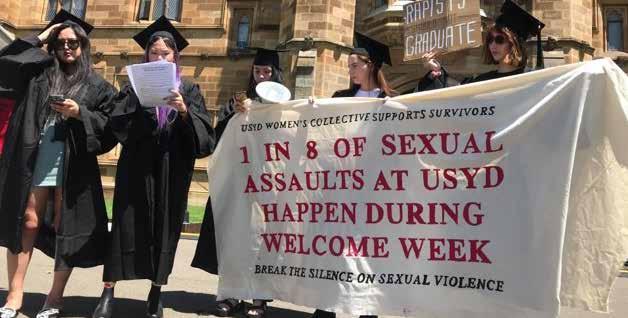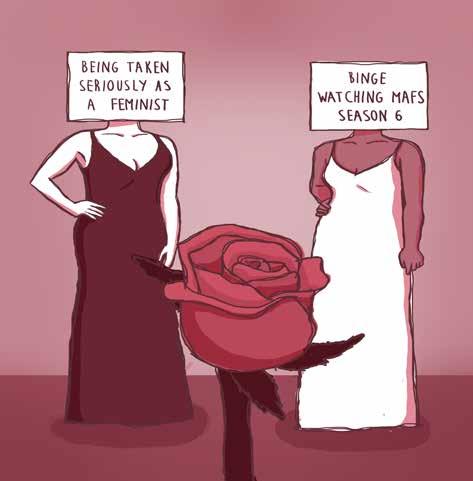
11 minute read
News
Nina Dillon Britton and Lara Sonnenschein report.
Vice Chancellor of the University of Sydney (USyd) Michael Spence last Wednesday announced that he would be leaving the role in December of this year, ending a tenure he’s held since 2008.
Advertisement
This is despite the fact that Spence had accepted an invitation to stay in the role until 2022. Instead, he will take up an appointment as President and Provost of University College London (UCL) in January 2021.
During his time as Vice Chancellor, Spence has clashed with students and staff alike over University decisions.
In 2012, 100 University staff members were made redundant. The following year saw seven days of strikes led by the National Tertiary Education Union (NTEU) over the enterprise agreement concerning pay and conditions of staff. The University’s reputation took a significant hit during this period, as students complained about the force police used on campus. In 2014, he was roundly criticised for failing to oppose the fee deregulation measures of the Abbott government.
In 2016, Spence oversaw the closure of the treasured Callum Park Sydney College of the Arts campus. Despite stating publicly that the closure was financially motivated, documents obtained by Honi in 2017 indicated that to be untrue.
Further, in 2017 the University refused to come out publicly in support of marriage equality during the plebiscite debate, Spence arguing that coming out in favour of the “yes” vote would compromise the institution and have a “potentially chilling effect on debate.” This is despite the fact that other universities came out in favour of marriage equality.
From 2018 to 2019, Spence had advocated for the right-wing Ramsay Centre being housed at USyd, proposing to introduce a “Bachelor of Western Civilisation”.
During his time as Vice Chancellor, Spence has been seen as key proponent of the corporatisation of the University, as he oversaw the restructuring of the University which led to increasing casualisation of staff.
Spence has also been criticised for inaction on campus sexual violence. Despite supporting the Broderick Review, feminist activists have argued there has been no meaningful change in the way the University responds to sexual assault and harassment.
The University’s search for a new Vice Chancellor has already begun.
Simon Hardman to resign as Head of Campus Security
Lara Sonnenschein reports.
Head of Campus Security and Emergency Management Simon Hardman is set to resign on 13 March this year after less than three years in the role.
Hardman has previously come under sharp criticism from students on campus over homophobic treatment. Last year Honi obtained documents under freedom of information laws which showed that Campus Security had received a complaint alleging homophobic behaviour, but had failed to investigate the matter.
The complainant messaged the University of Sydney Facebook page alleging that Campus Security confronted two men in a campus bathroom and addressed them saying, “you’re going to be charged faggots.”
Last year, Hardman was also found by a tribunal to be homophobic in his previous job as Superintendent of the Newtown Local Area Command.
In a momentous legal win over the New South Wales Police Force, four gay police officers showed that homophobia “unconsciously or consciously” drove Hardman’s mistreatment of them. As their boss, Hardman had made false complaints about the officers accusing them of taking drugs and having “loose morals”, which resulted in the police officers being the subject of a six month long undercover surveillance operation. However Hardman’s interaction with the University of Sydney began even before he was employed by the University. In 2013, as the National Tertiary Education Union (NTEU) and students were striking over pay and conditions, Hardman as Newtown Superintendent collaborated with University management against the strikes. The strikes saw well-documented violence from the police. Then Campus Security Manager Morgan Andrews even wrote to Hardman saying, “Let me know when you want a milkshake.” Students’ Representative Council (SRC) Queer Officers Priya Gupta, Paola Ayre and Oliver Mackie Pawson told Honi “while we are glad that Mr Hardman will no longer be the Head of Security at Sydney University, it is disappointing that he was ever employed, considering his history both as a police officer and allegations of homophobia.”
“While we know that the safety of queer people has never historically been provided from security and enforcement structures, we nevertheless will agitate the University to continually do better and fight homophobia wherever it arises.”
WoCo calls for action on sexual violence at Welcome Week
Nina Dillon Britton reports.
Wearing graduation caps and gowns adorned with sexual violence statistics, the Wom*n’s Collective rallied against sexual violence at Welcome Week on Wednesday.
WoCo drew attention to Red Zone Report estimates that “68 college students are raped each week in Australia” and “78% of students don’t know how to report sexual assault.” The report, published by End Rape on Campus Australia in 2018 provides a much franker image of the grim state of sexual violence at Australian universities than the Broderick Review into USyd colleges.
Co-Women’s Officer Vivienne Guo told Honi that Welcome Week is a “notoriously dangerous time” for students with “1 in 8 of all sexual assaults in a year happen[ing] during Welcome Week.” Guo said that it was particularly important for the action to happen today because “WoCo believes that it is critical to call out the University when it fails students and prioritises its public image over our safety.”
In a media release, WoCo said that the protest was “specifically targeting the false pristine reputation of this University” and that they were “peeling back the thin veneer to reveal their rotten core – elitism, sexism, and racism.” WoCo also distributed flyers demanding a “rape free campus” to onlookers, detailing key statistics and stories of sexual violence at USyd.
Last year, University management and the University of Sydney Union renamed “O-Week” “Welcome Week” over concerns the name was too associated with sexual violence.
Photos by Jazzlyn Breen.

Students protest travel ban at Welcome Week Lara Sonnenschein reports.
Students gathered outside Fisher Library early Wednesday, the first day of Welcome Week, to protest the Australian Government’s China travel ban in response to the coronavirus. Organised by the University of Sydney Students’ Representative Council (SRC) the rally called for lifting the ban and a public health response to the situation, with a strong anti-racist message.
Co-General Secretary Abbey Shi chaired the rally, noting that the World Health Organisation (WHO) has said that travel bans are unnecessary measures to deal with the virus. Shi, along with SRC President Liam Donohoe have been leading the student response on the issue, with Shi’s petition opposing the ban signed by over 4000 international students.
All the student speakers at Wednesday’s rally situated the Australian Government’s response within a wider context of racism, Sinophobia and the increasing corporatisation of the higher education sector. Co-Women’s Officer Ellie Wilson spoke to Sinophobia as a longstanding tradition, whilst also highlighting past racist incidents on campus, such as a Chinese student being punched on campus last year, and a Sinophobic survey administered at SRC polling booths last year.
In a statement read out by Abbey Shi, Kigen Mera, one of the International Student Officers at the SRC, noted Australia’s inadequate response to the virus, particularly in light of international students paying “40,000 dollars a year”. He also compared Australia’s lacklustre response to other countries in the region who were doing more, such as Japan.
National Union of Students (NUS) Ethnocultural Officer Vinil Kumar referenced Angela Davis’ quote, saying that it is “not enough to be non-racist, we must be anti-racist.” He called Australia’s response to the health crisis “brutal authoritarianism” saying that the Government’s response has added “fuel on the fire of already elevated anti-Chinese sentiment.” Kumar also spoke to several demands including, extending the visas on all those affected, making sure that universities do not penalise students academically or financially, as well as providing professional counselling and support services. Further, he spoke to the fact that universities should provide financial assistance for impacted students including help with rent.
Cooper Forsyth from the Campus Refugee Action Collective situated the Government’s travel ban within the wider framework of the Australian border regime, arguing that “it is the same Government which continually stokes the flames of racism.” Forsyth passionately ended his speech with, “fuck ScoMo, lift the ban, open the borders now!”
SRC President Liam Donohoe offered his full solidarity to all those affected by the virus, racism and those displaced by Western governments. He also said that international students are “only seen as a dollar figure” and noted that a lot of Australia’s response is driven by imperialist tensions. In a call to action, Donohoe stressed that students must be consistently fighting for international students’ rights “even when the chips are down, even when there’s not much media.”
Other speakers included New South Wales Secretary of the National Tertiary Education Union (NTEU) Michael Thompson and Erin Chew, the National Convenor of the Australian Asian Alliance. Thompson spoke to the strains the ban will have on the higher education sector, noting how much international students contribute to universities’ revenue. At the end of his speech, Thompson declared “no to racism, no to the market university, no to the university solely for money.”
Chew spoke to the racism that Chinese people have been facing on a daily basis since the ban, including people moving away from Chinese people coughing or sneezing on the train. She pointed out that Australia’s response is inconsistent with previous responses to health issues, such as Mad Cow disease and the common flu. “Are we afraid of the yellow peril?”, she said. The rally comes after the Morrison government extended the travel ban for an extra week after the initial ban on 1 February. Approximately 14,000 Chinese international students from USyd are impacted by the travel ban in light of being home for the holidays and Lunar New Year. Should the ban continue, it is estimated that the higher education sector, Australia’s third largest export worth $38billion will lose a minimum of $8 billion if Chinese international students are not allowed to return this semester.
Thousands unite for climate justice in Sydney for national day of action
Tom Williams reports.
Thousands of protestors gathered at Town Hall on Saturday to demand immediate climate action. The rally was organised by the newly formed Climate Justice Alliance, a collaboration between unions, NGOs, student groups and grassroots environmental groups.
Protestors marched from Town Hall to Hyde Park to demand First Nations justice, publicly owned renewables, an end to fossil fuel and nuclear projects and compensation for firefighters.
The politics of the event were dominated by the recent summer of devastating fire. Speakers emphasised the need for better funding and an “Indigenous led methodology, working under the traditional custodians of the land.”
Jim Casey from the Fire Brigade Employees Union condemned budget cuts, inadequate equipment and a lack of compensation for workers. “We need to see an expansion of paid labour within this industry.”.
“The bigger question is that the world is warming… Emergency services workers like me, we cannot actually fix this, all we can do is treat the symptoms.” Oliver Costello from the Firesticks Alliance supported this sentiment, and cautioned governments ignoring First Nations voices in fire management.
“Human induced climate change driving changes in the atmosphere that will take centuries to overcome.”
“Reintroduce cultural fire regimes to mitigate the effects of future fire to come, to help heal the land… our people have the knowledge.”
Speakers also highlighted the need for a just transition and publicly owned Union of Australia and co-facilitator of the rally condemned the government’s climate and energy policy.
“They will throw public money at aging fossil fuel projects but will not lift a finger to fund the renewable energy we need and the just transition for workers.”
“We know the real hazard is his climate denialist government and the
Jim Casey addresses the rally in Town Hall Square. Photo: Zac Rudge.

renewables, building upon similar demands from rallies late last year.
Erima Dall from the Maritime corporations that are profiting off the destruction of this planet.”
Electrical Trades Union National Assistant Secretary Michael Wright addressed the necessity of publicly owned renewables and an associated just transition for workers.
“The continued sale of our assets makes it harder for us to transition to a clean future. We need to have a people centric approach.”
Chants of “climate justice, workers rights, one struggle, one fight” rang out through the square.
Seth Dias, the state convenor of the Australian Students Environment Network and co-facilitator of the rally told Honi that “the Climate Justice Alliance was formed in order to have a timely, united and strong response to the climate emergency. We recognise that rallies called by many social justice organisations, student collectives and unions in collaboration would be far more impactful than if called alone. This rally was a great first example of this, almost 35 different organisations endorsed it and there was a firm showing of approximately 10,000 people.”
“The CJA will be holding a town hall style forum on the 11th March... The next major projects for the alliance will likely be building toward the ‘month of MAYhem’.”










